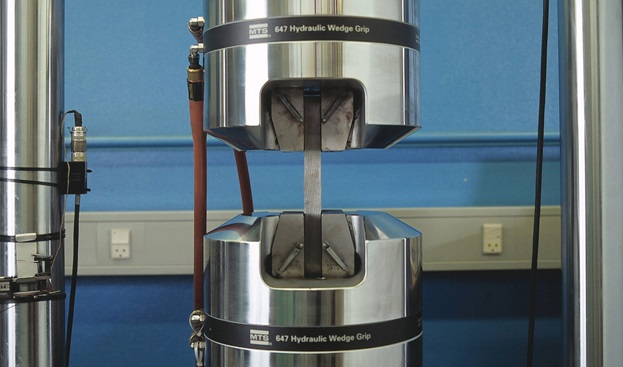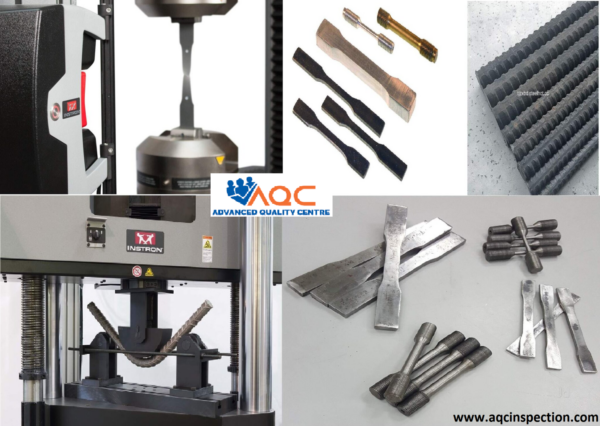Materials Test Lab Radiance: Decoding Quality with Expertise
Wiki Article
Putting Materials to the Test: Checking Out the Function of Products Examination Labs
Materials examination labs play a crucial function in ensuring the quality and integrity of different materials made use of in markets such as manufacturing, aerospace, and building and construction. Via a combination of sophisticated strategies and specialized devices, products test laboratories are able to examine the residential or commercial properties of steels, polymers, compounds, and other materials under different problems and stress factors. This article will check out the relevance of materials screening, the kinds of products evaluated, screening methods and tools made use of, as well as the applications of materials test results.Significance of Products Testing
Frequently evaluating the quality of products is critical in making certain the stability and security of products in numerous markets. Products testing entails subjecting products to various examinations and experiments to examine their mechanical, physical, and chemical homes.Among the crucial reasons that products testing is essential is the guarantee of product top quality. Through strenuous testing, suppliers can determine any flaws or weaknesses in the products used for their items. This allows them to make necessary renovations to enhance the total quality and efficiency of their products. Moreover, materials screening aids in determining possible concerns that may occur throughout the item's lifecycle, such as wear and tear, corrosion, or structural failings. By attending to these issues early on, manufacturers can avoid expensive recalls, lawsuits, and reputational damages.
By subjecting products to various examinations, manufacturers can establish their stamina, durability, and resistance to outside variables such as warm, stress, or chemicals. Whether it is auto parts, clinical tools, or construction products, products testing aids in recognizing any type of potential safety and security dangers and developing proper procedures to mitigate them.
Kinds of Materials Tested
Various kinds of products are evaluated in materials examination labs to evaluate their mechanical, physical, and chemical properties. These products can include a vast array important, including steels, polymers, porcelains, compounds, and even natural materials such as timber and concrete.Steels are commonly tested due to their extensive usage in numerous sectors. Compounds, which are composed of two or more various products, are examined to comprehend their general performance, consisting of variables like flexibility, durability, and toughness.
Natural materials like timber are evaluated to evaluate their strength, dampness material, and resistance to decay (materials test lab). Concrete is an additional typically tested product, with tests concentrating on its compressive toughness, sturdiness, and resistance to environmental variables
Along with these products, materials examination labs additionally examine finishes, paints, adhesives, and various other products used in building and construction, manufacturing, and various other industries. By subjecting these products to extensive screening, researchers and engineers can collect important information to inform product choice, layout optimization, and quality assurance processes.
Testing Methods and Tools
Testing methods and equipment play a critical role in products examination labs for assessing the mechanical, physical, and chemical homes of different products. These techniques and tools are important in making sure the top quality, reliability, and safety of materials utilized in numerous sectors such as aerospace, automobile, building and construction, and clinical.One generally used testing method in materials test labs is mechanical screening, which entails subjecting products to various forces or loads to determine their strength, hardness, ductility, and other mechanical homes. This is often done using equipment such as universal testing machines, which can apply tensile, compressive, and flexing pressures to examine specimens.
Physical testing techniques are also employed to assess residential or commercial properties such as density, viscosity, this website thermal conductivity, and electric conductivity. Equipment such as density meters, viscometers, thermal conductivity analyzers, and electric conductivity meters are made use of click for info to execute these examinations precisely.
Chemical screening techniques are made use of to establish the chemical make-up and pureness of materials. Techniques such as mass, spectroscopy, and chromatography spectrometry are frequently utilized, along with customized equipment designed for these objectives.

Applications of Materials Test Results
The outcomes of products testing give valuable insights right into the efficiency and suitability of different materials for particular applications in various industries - materials test lab. These test results play an important function in figuring out the high quality, longevity, and safety and security of products utilized in making proceduresOne of the essential applications of materials test results remains in the area of building. Engineers and designers depend on these results This Site to select appropriate products for constructing frameworks, such as bridges, high-rise buildings, and domestic buildings. By conducting tests on products like concrete, steel, and wood, they can guarantee that these materials meet the called for criteria and can stand up to various ecological conditions.
In the aerospace industry, products test results are essential in establishing the viability of materials for airplane components. By subjecting products to rigorous screening, engineers can examine their mechanical residential or commercial properties, resistance to warmth and corrosion, and capacity to withstand high-stress problems. This info is crucial in making sure the safety and dependability of aircraft.

Future Fads in Materials Screening
In the realm of products testing, innovations in materials examining approaches are forming the trajectory of the field, ushering in a brand-new age of technology and precision. As modern technology continues to progress, so does the need for advanced screening techniques and devices. One future fad in materials screening is the assimilation of synthetic knowledge (AI) and artificial intelligence formulas into screening processes. These innovations have the possible to enhance the effectiveness and precision of examination outcomes by evaluating big quantities of data and determining patterns that might not be easily noticeable by human beings. In addition, the use of non-destructive testing techniques is coming to be increasingly popular. These approaches enable the assessment of material buildings without creating damage or alteration to the sample, making them perfect for checking irreplaceable or beneficial materials. Additionally, there is an expanding concentrate on sustainability in materials testing. This consists of the development of screening methods that reduce waste and energy consumption, as well as using environmentally-friendly materials in screening tools. On the whole, the future of products screening is identified by continual innovation and a dedication to boosting efficiency, precision, and sustainability.Conclusion
In verdict, materials screening plays an important role in numerous markets by ensuring the high quality, safety, and efficiency of materials utilized in items and structures. It entails testing a variety of products using various techniques and tools to review their mechanical, physical, and chemical residential properties. The outcomes acquired from products testing are utilized to make enlightened decisions in product layout, production, and choice processes. As modern technology advancements, materials examining laboratories will remain to adapt and boost their approaches to meet the advancing needs of industries.Via a mix of innovative methods and specific devices, materials examination labs are able to evaluate the residential properties of metals, polymers, composites, and other products under numerous conditions and stressors. By conducting examinations on products like steel, concrete, and timber, they can ensure that these products fulfill the needed standards and can withstand numerous ecological problems.
In the aerospace market, materials examination results are essential in establishing the viability of materials for airplane elements. By testing products for their resistance, toughness, and versatility to impact, manufacturers can pick the most appropriate materials for various vehicle components, such as body panels, engine parts, and safety and security functions.In the world of materials screening, improvements in materials testing methods are shaping the trajectory of the field, ushering in a brand-new era of technology and precision.
Report this wiki page